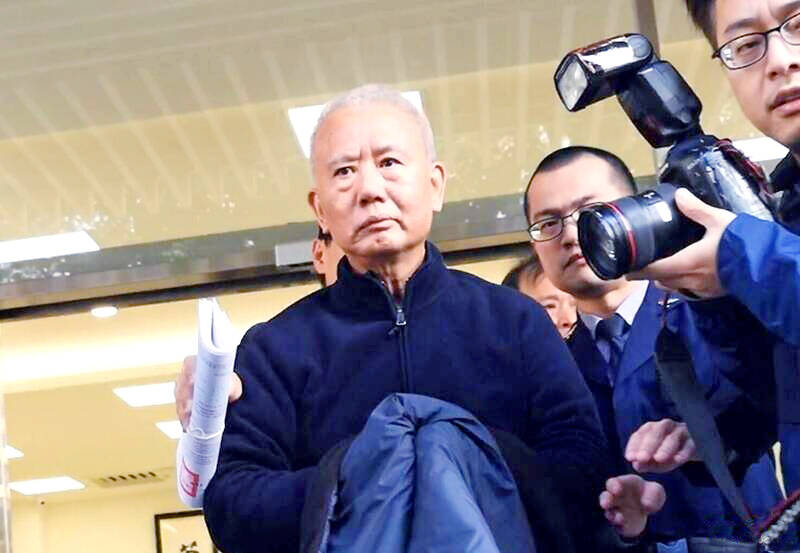The High Court yesterday upheld a ruling that former Ting Hsin International Group (頂新集團) executive Wei Ying-chun (魏應充) be fined and not face more jail time for his role in a 2014 cooking oil scandal.
The High Court’s Taichung Branch upheld the decision on 83 counts — which carried a 10-year, two-month prison sentence that could be commuted to a fine of NT$3.71 million (US$120,800), or NT$1,000 per day of the prison term — after the High Prosecutors’ Office did not appeal.
The decision to commute the penalty sparked outrage online, with comments on the Liberty Times (the Taipei Times’ sister newspaper) article about the ruling condemning the justice system.

Photo: Chang Jui-chen, Taipei Times
One Internet user surnamed Kuo (郭) wrote: “How can judges permit him to merely pay a fine and avoid prison?”
“He and the Wei family are rich. They only fear getting locked up,” they said. “This kind of ruling encourages wealthy people to commit crimes.”
A person surnamed Chien (錢) wrote that a “10-year sentence means it is a serious crime, so he should be imprisoned. The dinosaur judges and prosecutors who decided not to appeal should be charged with dereliction of duty.”
“Are Taiwan’s courts permitting criminals who are rich to not serve prison time?” another person wrote.
Wei has been sentenced to prison three times for his role in the scandal.
Most recently, he was convicted in July last year and sentenced to nine years and two months for contravening the Act Governing Food Safety and Sanitation (食品安全衛生管理法) and other offenses.
Wei was released on January after serving only six months, with judicial officials saying that portions of the sentence could be commuted to fines totaling NT$176 million, which the Wei family paid in January, and that he was eligible for parole for good behavior.
Moreover, Wei’s sentence included time he had already served pending earlier investigations and hearings, they said.
In 2014, investigators found that Wei and other company executives instructed that animal feed-grade material from Vietnamese firm Dai Hanh Phuc Co be imported.
Wei sought to cut costs by changing the formulas for 14 blended-oil products his companies produced, including one falsely marketed as a premium class of blended oil that was actually 98 percent palm oil.
The scandal created a food-safety furor and led to class-action lawsuits against Ting Hsin and its subsidiaries.
Wei’s first conviction was for breaches of food safety rules and fraud, with the Intellectual Property Court in April 2017 handing him a two-year term, of which he served just over 500 days before being paroled in December 2018.

CHAOS: Iranians took to the streets playing celebratory music after reports of Khamenei’s death on Saturday, while mourners also gathered in Tehran yesterday Iranian Supreme Leader Ayatollah Ali Khamenei was killed in a major attack on Iran launched by Israel and the US, throwing the future of the Islamic republic into doubt and raising the risk of regional instability. Iranian state television and the state-run IRNA news agency announced the 86-year-old’s death early yesterday. US President Donald Trump said it gave Iranians their “greatest chance” to “take back” their country. The announcements came after a joint US and Israeli aerial bombardment that targeted Iranian military and governmental sites. Trump said the “heavy and pinpoint bombing” would continue through the week or as long

TRUST: The KMT said it respected the US’ timing and considerations, and hoped it would continue to honor its commitments to helping Taiwan bolster its defenses and deterrence US President Donald Trump is delaying a multibillion-dollar arms sale to Taiwan to ensure his visit to Beijing is successful, a New York Times report said. The weapons sales package has stalled in the US Department of State, the report said, citing US officials it did not identify. The White House has told agencies not to push forward ahead of Trump’s meeting with Chinese President Xi Jinping (習近平), it said. The two last month held a phone call to discuss trade and geopolitical flashpoints ahead of the summit. Xi raised the Taiwan issue and urged the US to handle arms sales to

BIG SPENDERS: Foreign investors bought the most Taiwan equities since 2005, signaling confidence that an AI boom would continue to benefit chipmakers Taiwan Semiconductor Manufacturing Co’s (TSMC, 台積電) market capitalization swelled to US$2 trillion for the first time following a 4.25 percent rally in its American depositary receipts (ADR) overnight, putting the world’s biggest contract chipmaker sixth on the list of the world’s biggest companies by market capitalization, just behind Amazon.com Inc. The site CompaniesMarketcap.com ranked TSMC ahead of Saudi Aramco and Meta Platforms Inc. The Taiwanese company’s ADRs on Tuesday surged to US$385.75 on the New York Stock Exchange, as strong demand for artificial intelligence (AI) applications led to chip supply constraints and boost revenue growth to record-breaking levels. Each TSMC ADR represents

Pro-democracy media tycoon Jimmy Lai’s (黎智英) fraud conviction and prison sentence were yesterday overturned by a Hong Kong court, in a surprise legal decision that comes soon after Lai was jailed for 20 years on a separate national security charge. Judges Jeremy Poon (潘兆初), Anthea Pang (彭寶琴) and Derek Pang (彭偉昌) said in the judgement that they allowed the appeal from Lai, and another defendant in the case, to proceed, as a lower court judge had “erred.” “The Court of Appeal gave them leave to appeal against their conviction, allowed their appeals, quashed the convictions and set aside the sentences,” the judges